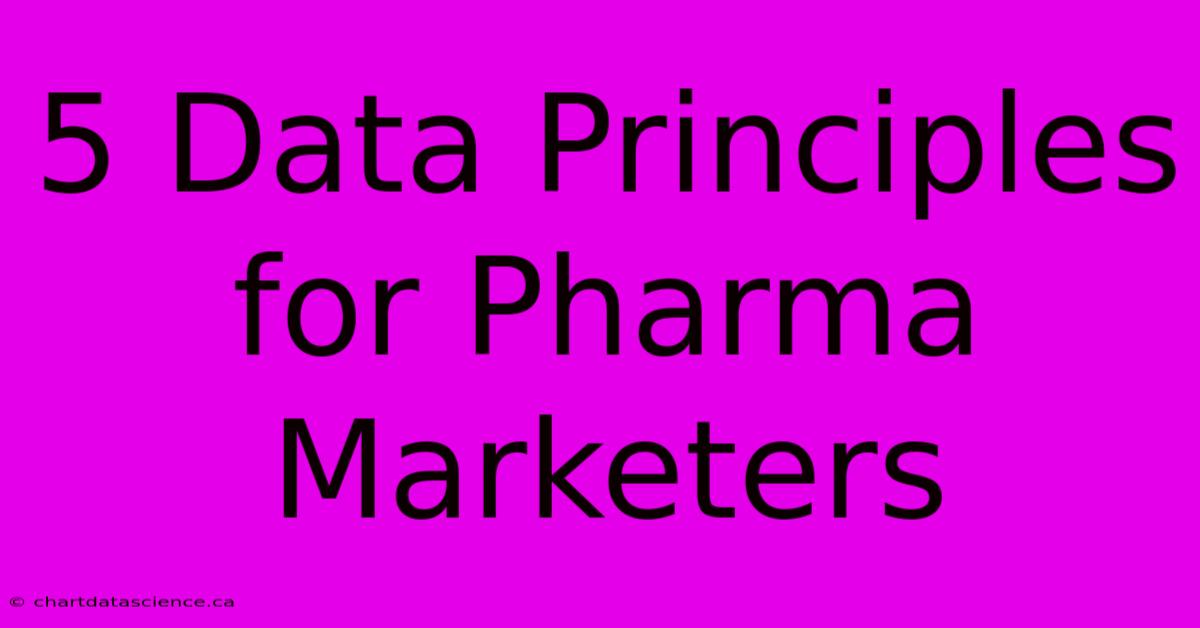5 Data Principles For Pharma Marketers

Discover more detailed and exciting information on our website. Click the link below to start your adventure: Visit My Website. Don't miss out!
Table of Contents
5 Data Principles for Pharma Marketers
Pharmaceutical marketing is undergoing a dramatic transformation, driven by the explosion of available data and the increasing sophistication of analytical tools. Navigating this landscape requires a clear understanding of key data principles. Ignoring these principles can lead to ineffective campaigns, missed opportunities, and even regulatory issues. This article outlines five crucial data principles for pharma marketers to embrace for success.
1. Data Privacy and Compliance: The Foundation of Trust
Above all else, data privacy and compliance must be the cornerstone of any pharma marketing strategy. The industry is heavily regulated, with strict rules surrounding the collection, use, and storage of patient data. Failure to comply can result in significant fines and reputational damage.
Key Considerations:
- GDPR, CCPA, HIPAA, etc.: Familiarize yourself with all relevant regulations in your target markets.
- Data Minimization: Collect only the data absolutely necessary for your marketing objectives.
- Consent Management: Obtain explicit and informed consent from individuals before collecting and using their data.
- Data Security: Implement robust security measures to protect patient data from unauthorized access and breaches.
- Transparency: Be transparent with individuals about how their data will be used.
Ignoring these aspects can severely damage your brand and lead to legal repercussions.
2. Data Quality: Garbage In, Garbage Out
The accuracy and reliability of your data directly impact the effectiveness of your marketing campaigns. Poor data quality leads to inaccurate insights, flawed targeting, and wasted resources.
Ensuring Data Quality:
- Data Validation: Implement rigorous validation processes to ensure data accuracy and completeness.
- Data Cleansing: Regularly clean your data to remove duplicates, inconsistencies, and outdated information.
- Data Sources: Use reputable and reliable data sources.
- Data Governance: Establish clear processes and protocols for data management and quality control.
High-quality data is the bedrock of successful marketing decisions. Investing in data quality processes is an investment in the future success of your campaigns.
3. Data-Driven Insights: Beyond Descriptive Analytics
Moving beyond simple descriptive analytics is crucial. Pharma marketers need to leverage data to gain actionable insights that inform strategic decisions. This involves using advanced analytical techniques to identify trends, patterns, and correlations.
Leveraging Data for Insights:
- Predictive Analytics: Use historical data to predict future trends and behaviors.
- Prescriptive Analytics: Use data to recommend optimal actions and strategies.
- A/B Testing: Test different marketing approaches to determine which are most effective.
- Cohort Analysis: Analyze the behavior of specific groups of patients to identify patterns and preferences.
Data-driven insights allow for more targeted, personalized, and effective marketing.
4. Omnichannel Integration: A Holistic View of the Customer
The modern customer interacts with pharmaceutical brands across multiple channels. Pharma marketers must integrate data from all these channels to gain a holistic understanding of the customer journey. This enables personalized messaging and targeted interventions at the right moment.
Omnichannel Data Integration:
- CRM systems: Integrate data from CRM systems to track customer interactions.
- Website analytics: Analyze website traffic and user behavior.
- Social media data: Track social media engagement and sentiment.
- Email marketing data: Monitor email open rates and click-through rates.
By combining data from various sources, marketers gain a comprehensive view of their customers' needs and preferences.
5. Continuous Learning and Adaptation: Embracing Agility
The data landscape is constantly evolving. Pharma marketers must embrace a culture of continuous learning and adaptation to stay ahead of the curve. This requires ongoing monitoring of data trends, experimentation with new technologies, and a willingness to adjust strategies based on new insights.
Continuous Improvement:
- Regular data analysis: Regularly review data to identify trends and areas for improvement.
- Experimentation: Experiment with new marketing techniques and technologies.
- Feedback loops: Establish feedback loops to gather insights from customers and stakeholders.
- Stay updated: Keep abreast of new data privacy regulations, technologies, and best practices.
A commitment to continuous learning and adaptation is essential for long-term success in pharmaceutical marketing.
By adhering to these five data principles, pharmaceutical marketers can leverage the power of data to create more effective, compliant, and impactful campaigns. This will ultimately improve patient outcomes and contribute to the success of the pharmaceutical industry.

Thank you for visiting our website wich cover about 5 Data Principles For Pharma Marketers. We hope the information provided has been useful to you. Feel free to contact us if you have any questions or need further assistance. See you next time and dont miss to bookmark.
Also read the following articles
| Article Title | Date |
|---|---|
| Virgin Rivers Season 6 Creator Interview | Dec 20, 2024 |
| 55 000 Get Student Loan Forgiveness | Dec 20, 2024 |
| James Gunns Superman Trailer First Look | Dec 20, 2024 |
| Todays Crypto Dip How Severe Is It | Dec 20, 2024 |
| Vancouver Canucks Jersey History | Dec 20, 2024 |
